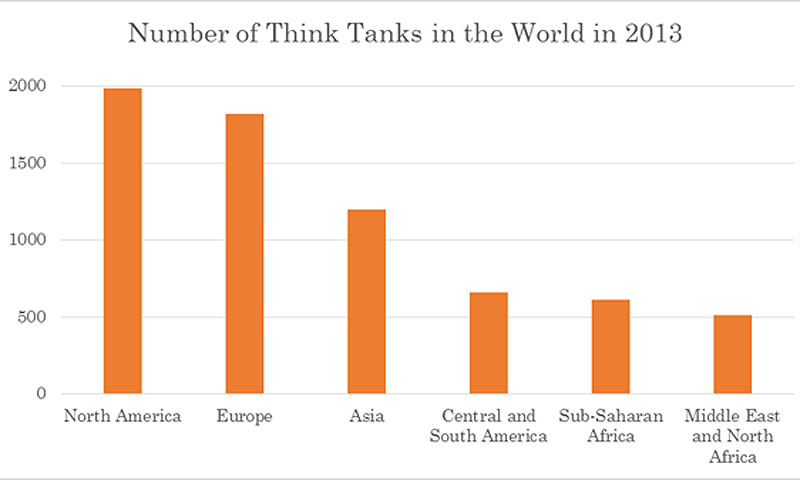Once they were rare and elitist. Now they are ubiquitous and accepting. Still, affiliation with a reputed think tank is a coveted prize for intellectuals and thought leaders. While thousands of think tanks are busy prescribing solutions for global challenges, disease, poverty, and war continue to consume hundreds of millions across the globe. One would rather have ‘do tanks’ comprising doers, and not just thinkers, to bring change that eludes us.
By one count there are over 6,800 think tanks in the world. The Think Tanks and Civil Societies Program at the University of Pennsylvania maintains a global database of think tanks and generates annual rankings of think tanks based on a survey of industry leaders. The 2013 Global Go To Think Index Report was released in January 2014 that ranked Alternate Solutions Institute promoting free market thinking as Pakistan’s most influential think tank.
The rapid growth of think tanks since the early 60s suggests a global demand for idea generating institutions. Think tanks have emerged on almost all matters of public interest. Some think tanks are primarily academic in nature and focus on generating scholarly publications. Others are more partisan outfits that are dedicated to serving their benefactors by influencing public policy or public opinion. Such influence peddling by certain very influential think tanks has met with public’s cynicism.
The Think Tank program at the University of Pennsylvania is rather unique. Each year it surveys a distinguished panel of almost 1,900 experts from think tanks, universities and media to rank think tanks in a variety of categories. In the first round, the 6,800 think tanks and thousands of journalists and development professionals are asked to nominate think tanks for rankings. Those institutions with five or more nominations are shortlisted for being ranked by the expert panel of 1,950 individuals and institutions.
North America continues to lead in the number of think tanks followed by Europe. Individually, the United States with 1,828 think tanks is far ahead of others in the number of nationally registered think tanks. With almost 400 think tanks, Washington, DC is the global hub of think tanks. China with 426 think tanks is a distant second followed by the United Kingdom with 287 think tanks. India with 268 think tanks is fourth on the list. The rankings recognised 19 think tanks from Pakistan. The Planning Commission, government’s premier thought generating body, didn’t make the cut.
 |
| Source: Think Tanks and Civil Societies Program at the University of Pennsylvania. |
The Washington, DC based Brookings Institution was recognised as the think tank of the year for 2013. Brookings is indeed an intellectual powerhouse that generates influential research on matters ranging from foreign policy to urbanization. Over 300 leading experts affiliated with Brookings generate research and ideas on public policy issues. The commentary and opinions are normative in nature and offer prescriptions. For instance, a recent blog post by Professor Madiha Afzal on Brooking’s website urges Prime Minister Nawaz Sharif to share his vision for the country with the masses while the peace talks with the Taliban continue. According to Professor Afzal, Mr. Sharif must talk to the people “to “win the war of words and ideas with the Taliban, and, along with it, the hearts and minds of Pakistani citizens.”
Outside of the United States, Chatham House in United Kingdom received the highest ranking for 2013. Stockholm International Peace Research Institute (SIPRI) in Sweden was ranked third. I have followed SIPRI’s work since early 90s. It was during a chance encounter with the renowned Indian journalist Parful Bidwai, whom I interviewed for The Frontier Post, that I learnt of SIPRI. I found Mr. Bidwai very knowledgeable of nuclear armament and asked him about the source of his information. SIPRI, he replied. Later in 1993, I had to travel to Lahore to consult SIPRI’s annual report at Quaid-e-Azam library. I couldn’t locate a copy in Islamabad.
The report ranks Alternate Solutions Institute as Pakistan’s top, and Central Asia’s third most influential, think tank. I am a bit surprised about this finding. Over the years, I have seen Sustainable Development Policy Institute to be the more influential think tank in Pakistan. I remember the days when Tariq Banuri used to run the enterprising Institute and as young journalists in the early 90s we were in awe of the place. Dr. Banuri portrayed intellectual elitism that we all despised, but still couldn’t resist SDPI’s lure. The Institute’s current office and programming is rather modest compared to its ‘glorious’ past. It could very well be true that other institutes have become more prominent over time. Alternate Solutions Institute though lists a book launch from 2012 under current events. This is uncharacteristic of an influential think tank whose most recent event is more than a year old!
Pakistan needs to deploy more brain power to find solutions for current challenges. A complete breakdown in law and order, sectarian and communal violence, high fertility and poverty, preventable diseases, illiteracy, and a struggling economy are some of the challenges faced by the nation. Think tanks can help devise solutions. There is, however, one big problem. A large number of think tanks in Pakistan are funded by well-meaning foreign sponsors.
Pakistani philanthropists have to change this practice. If we want indigenous solutions for our problems, we would have to invest in them. Charity of foreign taxpayers can accomplish only so much.












































